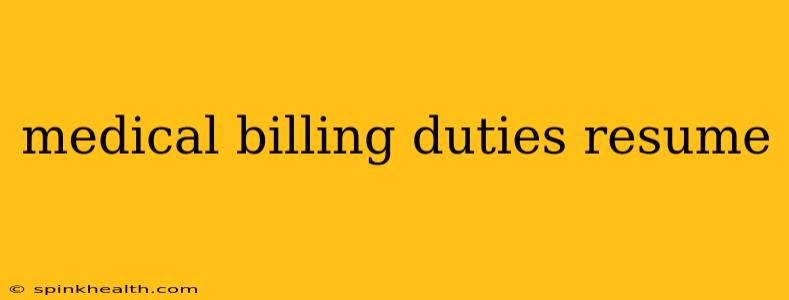Crafting a Winning Medical Billing Duties Resume: A Story of Success
Landing that dream medical billing job requires more than just listing your duties; it's about crafting a compelling narrative that showcases your skills and experience. Think of your resume as a story of your career achievements, highlighting how you've added value in every role. This isn't just a list—it's a persuasive argument for why you are the perfect candidate.
Let's break down how to tell this story effectively, addressing some common questions potential employers have:
What are the key duties of a medical biller?
This is often the first question an employer considers. Your resume should directly address this by using strong action verbs and quantifiable results. Instead of simply saying "Processed claims," try "Processed an average of 150 claims per week, achieving a 98% clean claim rate." See the difference? The second statement demonstrates efficiency and accuracy—qualities highly valued in medical billing.
Here are some key duties you can highlight, tailoring them to your specific experience:
- Claim Processing and Submission: Describe your proficiency in various claim submission methods (electronic, paper), your understanding of different payers' requirements (Medicare, Medicaid, private insurance), and your experience with clearinghouses.
- Coding and Auditing: Showcase your expertise in ICD-10 and CPT coding, your ability to identify and correct coding errors, and your experience with auditing claims for accuracy and compliance.
- Accounts Receivable Management: Detail your strategies for following up on unpaid claims, your experience with managing delinquent accounts, and your methods for improving payment collections. Quantify your successes—e.g., "Reduced accounts receivable by 15% within six months."
- Patient Billing and Collections: Explain your experience with patient statements, payment posting, handling patient inquiries and resolving billing issues, and managing patient accounts.
- Software Proficiency: List the billing software and systems you are proficient in (e.g., Epic, Cerner, Athenahealth). Mention any specific modules or features you've mastered.
- Compliance and Regulatory Knowledge: Highlight your understanding of HIPAA regulations, medical billing compliance requirements, and any relevant state or federal laws.
What skills should I emphasize on my resume?
Beyond specific duties, employers look for key skills. Your resume should prominently display these:
- Technical Skills: Proficiency in medical billing software, coding systems (ICD-10, CPT, HCPCS), electronic health record (EHR) systems.
- Analytical Skills: Ability to identify and resolve billing errors, analyze data to identify trends and improve efficiency.
- Communication Skills: Effective communication with patients, insurance companies, and other healthcare professionals.
- Problem-solving Skills: Ability to troubleshoot billing issues, resolve disputes, and find efficient solutions.
- Organizational Skills: Ability to manage large volumes of data accurately and efficiently, prioritizing tasks effectively.
How do I quantify my accomplishments?
Quantifiable results make your resume stand out. Instead of general statements, use numbers to demonstrate your impact:
- "Improved claim processing time by 10% through the implementation of a new workflow."
- "Reduced denials by 20% by proactively addressing coding errors."
- "Increased payment collections by 15% through improved follow-up procedures."
What if I'm a new graduate or have limited experience?
Even with limited experience, you can still create a strong resume. Focus on your relevant coursework, internships, volunteer work, and any skills you've developed. Highlight your eagerness to learn, your strong work ethic, and your commitment to the field. Consider including a portfolio of your work if possible.
How can I make my resume stand out?
- Use a professional and easy-to-read format: Choose a clean template and consistent font.
- Use strong action verbs: Start each bullet point with a dynamic verb that showcases your accomplishments.
- Tailor your resume to each job application: Customize your resume to match the specific requirements and keywords of each job description.
- Proofread carefully: Errors can undermine your credibility.
Your medical billing duties resume isn't just a document; it's your personal brand story. By carefully crafting your narrative, highlighting your achievements, and showcasing your skills, you can significantly increase your chances of landing your dream job. Remember to tell your story with passion and precision, and let your accomplishments speak for themselves.

